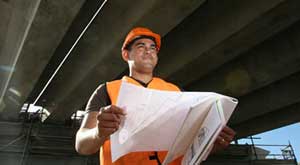Structural Engineer
Tasks & duties

Structural engineers may do some or all of the following:
-
meet clients to discuss their needs
-
visit clients' sites
-
prepare sketches, working drawings and specifications based on the sites, the clients' needs and building regulations
-
analyse test results, such as soil-sample tests from sites
-
design the construction of domestic, commercial and industrial building structures
-
make calculations to test the design of these structures to ensure they are able to withstand earthquakes, wind, gravity, snow and other natural forces
-
meet clients, architects, mechanical engineers and other specialists in the construction industry to discuss plans
-
liaise with local authorities, architects and clients to obtain permits
-
visit sites during construction to consult with builders and to check and ensure structures comply with plans and specifications
-
act as expert witnesses at court hearings
Skills & knowledge

Structural engineers need to have:
-
knowledge of civil engineering
-
knowledge of building materials
-
knowledge of how different soils behave beneath foundations
-
the ability to read and assess information about soil and rocks
-
knowledge of relevant legislation such as the Resource Management Act, the New Zealand Building Code, local by-laws and town planning regulations
-
knowledge of physics and maths
-
skills in analysing and interpreting information such as client requirements, plans and designs
-
problem-solving skills
-
planning and organisational skills
-
good communication skills
-
writing skills for producing reports
-
computer skills, including the ability to use computer-aided design (CAD) software
Entry requirements
To become a structural engineer you need a Bachelor of Engineering. A Diploma in Engineering (which replaced the New Zealand Certificate in Engineering) or an equivalent diploma may also be acceptable.
Secondary education
To enter tertiary training, Bursary or NCEA equivalent English, maths with calculus, physics and chemistry is preferred.
Training on the job
Skills are gained on the job. Structual engineers may attend courses, seminars, workshops and conferences to keep their skills up to date.
Structural engineers may apply to the Institution of Professional Engineers New Zealand (IPENZ) to become a chartered professional engineer (CPEng) after:
- completing relevant qualifications
- gaining appropriate work experience (usually four to five years)
- completing a practical competency assessment
To maintain registration chartered engineers need to demonstrate their ability to practice and evidence of undertaking professional development at least every five years.
Registration
Structural engineers should be registered with the Institution of Professional Engineers New Zealand (IPENZ).
Useful experience
Useful experience for structural engineers includes draughting, engineering technician or surveying work, or work in the building construction industry.
Related courses
Building Science and Technology
Construction Engineering
Road Construction
Structural Engineering
For more information, please refer to Career Services.
Sponsors include
Document Actions
